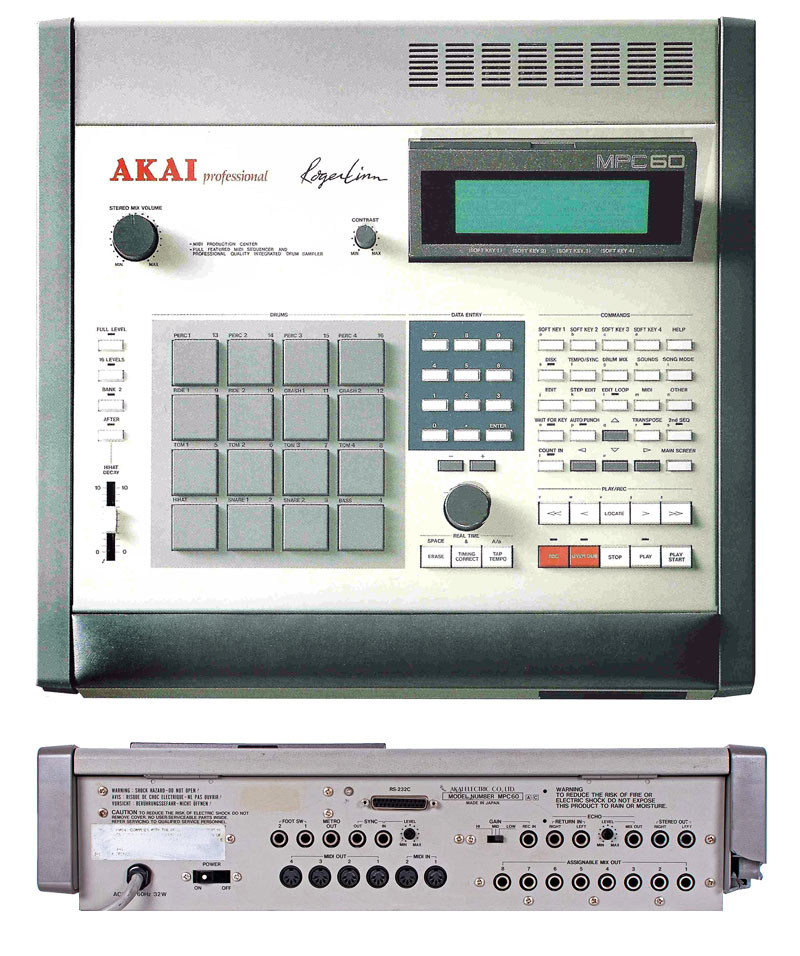I just realised we didn't have the damned mpc60 in the listins! - so here is some info to get it in asap
The Akai MPC60 ("MIDI Production Center 60") was an electronic musical instrument produced in 1988, by the Japanese company Akai in collaboration with celebrated designer Roger Linn. It combined MIDI sequencing and audio sampling with a set of velocity/aftertouch-sensitive performance pads, to produce an instrument optimized for use as a drum machine. The MPC60 enjoyed great popularity, particularly among musicians producing Hip Hop and similar styles.
The MPC60's success and popularity can perhaps be best understood in the context of earlier drum machines.
Early machines in the 1970s tended to use analogue synthesis for their sounds (characterful, but not very realistic) and only provided pre-set rhythms. By the late 1970s, use of microprocessors and affordable RAM memory led to the development of machines which allowed musicians to program their own rhythm patterns (e.g. the Roland CR-78).
In 1980, Roger Linn produced one of the world's first drum machines to use digital audio samples as the sound source, the Linn LM-1. This was very popular as these sampled sounds were generally much more realistic and "punchy" than analogue ones.
In 1983, the MIDI protocol was launched, as a standard way to interconnect electronic musical instruments, and quickly became very popular, replacing the plethora of manufacturer's incompatible proprietary interfaces. MIDI provided a ready way to synchronize the operation of drum machines with other studio devices, and enabled programmed rhythms to be exchanged as MIDI note data.
By the mid-1980s, machines such as the Sequential Circuits Inc. Studio 440 and Linn's own Linn 9000, combined powerful MIDI sequencers with the ability to sample one's own sounds. This offered much more flexibility in terms of what had been available before, both in terms of drum sounds, and the ability to integrate the drum machine with other studio devices. However neither of these machines were a great commercial success, and both Linn and Sequential ceased trading.
Roger Linn then began a design collaboration with Akai, drawing heavily on the Linn 9000 and Studio 440 concepts, resulting in the MPC60. Willie Wilcox produced & recorded all the original drum sounds shipped with the original Akai MPC 60.
- 16 velocity sensitive pads
- 4 pad banks (64 voices per program)
- sampling rate of 40kHz (freq response 20Hz - 18kHz)
- 16-bit ADC and DAC, with data stored in special non-linear 12bit format (for lower noise)
- 750kB sampling memory (13.1 seconds), upgradable to 1.5MB (26.2 seconds) (expansion card: EXM003)
- 128 sounds in memory, 64 sounds per program, 16 voice polyphony.
- 2 MIDI inputs, 4 MIDI outputs
- 20 songs, 99 sequences, 99 tracks, 60,000 note capacity
- timing resolution of 96ppq (parts per quarter note)
- syncable via MIDI Time Code (MTC), MIDI Clock, FSK24, SMPTE, 1/4 note click.
- SMPTE supported frame rates: 24, 25, 29.97 drop, and 30.
- 8 assignable outputs + 1 stereo + 1 effects send/return
- Internal 3�" floppy drive (Double Density 720 kB)
- optional 3rd-party SCSI interface (by Marion Systems)
[from Wikipedia]







Read 5 comments
Add review/comment